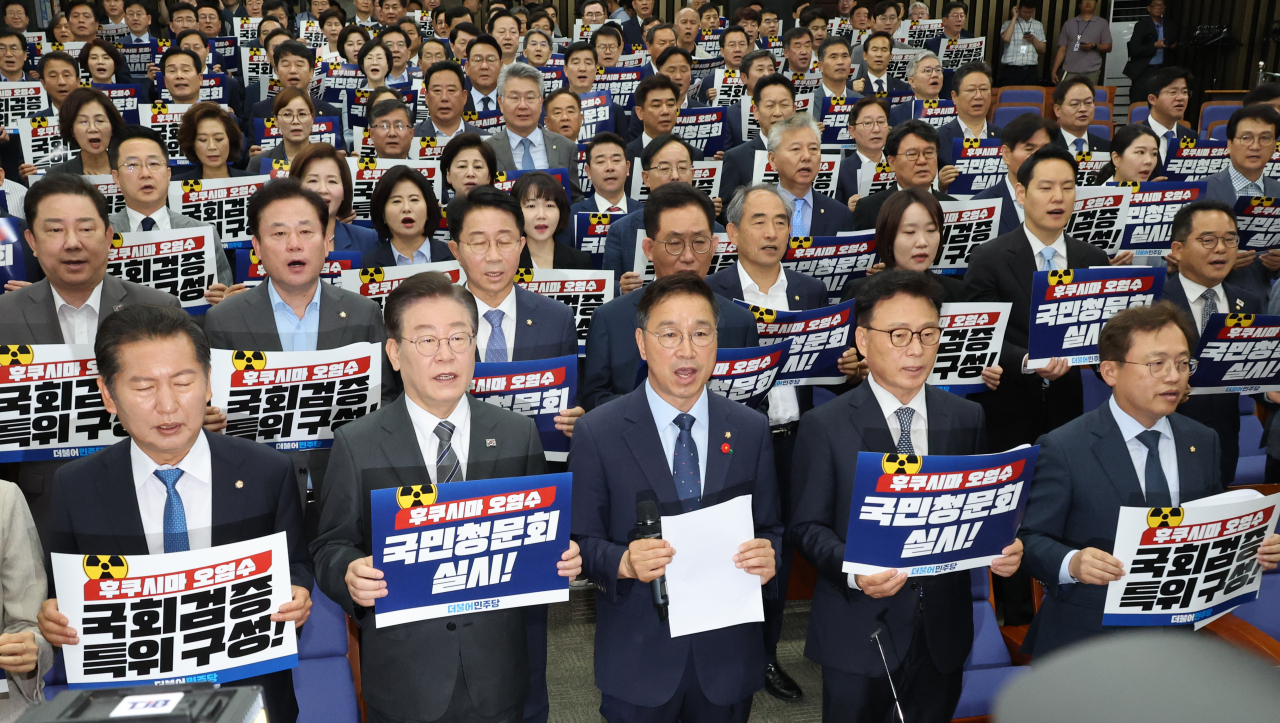‘Nuclear terrorism’: Democratic Party of Korea blasts ‘pro-Japan’ Yoon over Fukushima water
By Kim ArinPublished : June 12, 2023 - 15:46

The Democratic Party of Korea escalated its campaign against Japan on Monday, accusing President Yoon Suk Yeol of being weak on Tokyo and its plan to gradually release treated wastewater from the destroyed Fukushima nuclear power plant.
Ahead of the plenary session of the National Assembly, Democratic Party lawmakers issued a joint statement vowing to stop Japan from discharging the wastewater into the sea altogether.
“Our party will do everything in our power to block Japan from dumping its nuclear wastewater,” the statement, signed by the entire party, read. “To that end, we will be working with all sectors across the country as well as Pacific island countries and other regions directly affected.”
Rep. Lee Jae-myung, the Democratic Party’s leader, has characterized Japan’s plan to release the water “an act of nuclear terrorism” and blasted the Yoon administration for “risking being complicit.” He has accused the ruling party and the administration in office of “being pro-Japan” and “showing weakness to Japan.”
Lee, speaking at a dinner event with Chinese ambassador to Seoul Xing Haiming last week, also suggested South Korea and China team up against Japan’s wastewater discharge plan.
“As neighboring countries, I would like us to raise our voices if possible and come up with measures to respond to this problem together,” he told Xing.
Democratic Party lawmakers are individually coordinating separate initiatives that amplify the party’s anti-Japan stance, in protest of the Yoon administration’s push to mend ties with Tokyo. The party’s Rep. Kim Yong-min announced on this day he was taking a trip around the country’s coastal regions under the slogan, “Out with Radioactivity.”
Choi Eun-mi, a Korea-Japan relations researcher at the Asan Institute for Policy Studies, said the drama unfolding in Seoul is another example of Japan affairs being used by parties and interest groups for domestic political objectives.
“Issues and policies concerning Japan are prone to domestic political escalation in Korea, some of them understandably due to the colonial past,” she told The Korea Herald in a phone call.
The Fukushima wastewater issue, she said, is more than just between Korea and Japan.
“It’s unfortunate that Fukushima is being discussed as if it were Japan’s problem alone. Fukushima was an accident that hit Japan, but one that could happen anywhere,” she said.
“China, too, releases significant amounts of water from its nuclear power-related facilities. So if anything, it needs to be addressed as a global issue of nuclear power safety.”
That being said, she said there was room for Japan to be more transparent, like letting Korea and neighboring countries take samples of the water for testing and continuing to allow inspection not just in advance but while the discharge is in progress.
Minister of Foreign Affairs Park Jin, appearing at Monday’s plenary session, said Seoul would be opposed to the Fukushima water’s discharge unless safety concerns are thoroughly addressed.
“We are communicating with the Japanese side that the health and safety of the people is our utmost priority, and we would not stand by anything being discharged into the waters if its safety isn’t guaranteed,” the minister said in response to a Democratic Party lawmaker's question.





![[KH Explains] No more 'Michael' at Kakao Games](http://res.heraldm.com/phpwas/restmb_idxmake.php?idx=644&simg=/content/image/2024/04/28/20240428050183_0.jpg&u=20240428180321)













![[Herald Interview] Mistakes turn into blessings in street performance, director says](http://res.heraldm.com/phpwas/restmb_idxmake.php?idx=652&simg=/content/image/2024/04/28/20240428050150_0.jpg&u=20240428174656)
